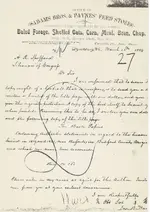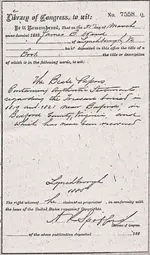[What became of the original manuscript that the unknown author presented to Ward, and the "letters", ciphers, and the famous iron box after the pamphlet was printed?]
Maybe they were put in the box...And the box......Got squirreled in Sherman's chimbly on the flue ,till it got transferred to the stove after copies were burned ;and the stove was stored until some Sweet Home Alabama guy...
Not helpin huh?
The feed store headed paper has been considered evidence of Wm John's being tied to Ward's efforts. By John's working there. Does that make John an accomplice? Or knowing of Wards doins?
I can grasp having stationary from there as easy as my latest feed mill hat given when requested. Even when no hats were in sight or giving them up was not standard practice. (I'm bad like that. But have some in my opinion expensive hats as token symbols of a business transaction in which my wallet has been lightened. Maybe it's time to ask for coats? )
Still ,not sure if engaged in nefarious activity if such an obvious connection as letterhead pointing at my employment would be sense-able.
My current practice with freebies/solicitation type pads of paper someone receives from charities that fall into my hands , and the rare ones directed to me...I tear the headers off usually if not being used for scrap/notes not leaving the house. (Sometimes in the house I tear them "clean" too.)

Not sure it represents an employees relationship with anything I do with it.
Folks give away calendars too. Does it matter who gives me one?






